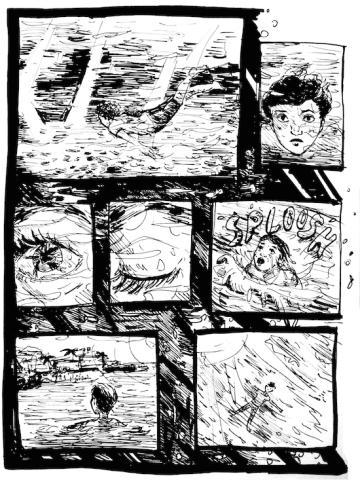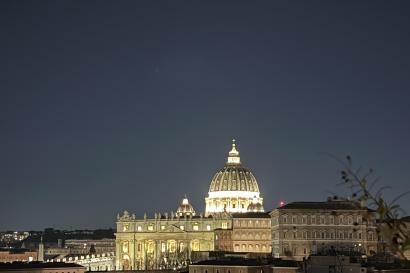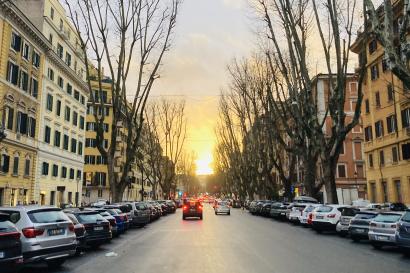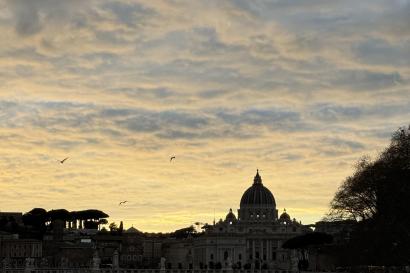
June 10, 2015
We’re sitting on an elevated patio, a restaurant on the next to the beach. I’m writing by the light of an old lamp: ornate, decrepit – metal left to the elements. Vaguely, I hear the waves, not so far below us; the sounds of Wolof from the ferry dock; the kids calling to each other on the beach beyond this low border wall.
It is the Île de Gorée. We are waiting for our dinner. When I look up, I am watching the light clattering quietly across the water, three strips stretching from the lights of the dock towards us. Earlier today I swam in that water. It was the first time I had swum in the sea for a long while – really swam, that is, immersed myself, dove into that deepening blue-green, sun and the sky and sea for miles, legs kicking out, the joyous splash of the surface breaking around me as I surged upwards, salt water streaming from my cheekbones. I took deep breaths. Ah, I thought. My childhood. How I am still so at home in the sea.
For a few moments, in a dive, eyes open: the strips of flickering blue might recall something else. Bodies, maybe, far or farther out. Buried deep. Dark masses long decayed, the waves carrying their presence to me like a century-dissipated scent.
It was a wild fantasy, fleeting and strange in my brown head. As I broke the surface it would be forgotten. The act of swimming, the blue water – it was something from the Philippines, some somewhere else transported. A place transmogrified in my intense and particular joy.
But now, here, at this restaurant. Sitting with seven other American kids. Two Moroccans. And the day sinks in. I kept trying to imagine this through my black college friend’s eyes, back in the United States – black, I say, though today’s talks prove the specificity of that. Here they would be metis, all of them. Perhaps would have owned slaves themselves a century or so ago. I asked a question about history from one of the Senegalese professors who gave talks today. About what it means, now. About how maybe it was not yet time to forgive, even if we could forget. I learned something about the differences and maybe it had to do with my language barrier but I don’t think he understood where I was coming from: race in America. Then again, I doubt I or the other Americans really understand things here. But this was the first time I faced a… border, a precipice in a non-Western mind, something I usually expect from the West: a not knowing and not knowing that you do not know.
And me, here? When we walked into the Maison des esclaves, the first thing I noticed was: that’s the staircase where Alice Walker and Tracy Chapman sat, that one on the right – in Warrior Marks: Female Genital Mutilation and the Sexual Blinding of Women, the terribly problematic if well-intentioned film we slammed in my transnational gender and sexuality class last semester. And then: so many important black figures have come here. And then: look at all these Senegalese school children! What do they think of this, what do they feel? For many African Americans, it is, I gather, I imagine, a deeply intense moment. Painful. Present? After today’s talk, I wondered if it was the same for Africans, for Senegalese. After all, they are the ones whose ancestors stayed, no? And maybe they could not fully realize how much pain and suffering came after. When they walked out that door. Boarded some ship. La porte du voyage sans retour.
How is it still here, breathing so softly.
They had their own pain, of course. The tour guide emphasized it; one of our speakers did too: how black Africa continues to be exploited. Once human resources, now natural. I was glad to hear it said, acknowledged, leveled like a weapon. How that destroys a place. To lose your sons. Daughters. Warriors, and workers. To lose your trees and the land they grown on, your rivers and your coasts. Life blood draining into hulls of Western ships.
Who am I, here? And does it matter?
I was noticing the white folks, on this tour. One with cornrows. I tried to wonder if she was some part black, somewhere, tried to see it in her face. A bit of a stretch, but maybe. Another white woman, with a bi-racial baby. Later I glimpsed her black husband. How did he feel? She? Two more: a white French couple, maybe, older. The woman was drinking from a soda can, commercial-bright purple jarring in the old stone house. My jaw tightened. Is this tourism, for you? A show?
Is it for me? The rest of the visit says… semi-yes. But in the Maison… I felt – I’m not sure. Like I was witnessing someone else’s tragedy. Mourning. Wake. Eulogy. Intense by association. By care. But not mine.
And this is not exactly true. I was explaining to our program director: my particular ancestors likely have little to do with this. My father’s side: American Jews a generation or two from Eastern Europe; Jews moving from one place to another, old-world persecution at their heels; Jews whose histories I do not even know – lost, perhaps, in the wash of whiteness their carriers assimilated into. My mother’s side: Filipinos in the Philippines until my mom came to the US for grad school; Filipinos with their own share of injustice to deal with, their own train of colonialism, imperialism, US-backed dictatorship, sex and slave trafficking, revolution and exploitation, diaspora and loss. I was explaining: these are the lines that reach me, the webs I stand on, the nets in which I am still feeling for the knots – but, relevant or not, I live in the USA. This world. I benefit from a country rich with stolen wealth. I am part of a society saturated by racism. And my father’s family, slowly joining that imaginary conglomeration, white, for the few generations they were there – they benefited, too.
So through the lines of identity, I am torn: guilty, apart, alike in suffering. Does it matter? Perhaps not, if it is left at that. If the narrowness of being substitutes for really doing the work – of healing, of reparations, of trying to right this world’s oh so many wrongs. But perhaps it is not unrelated, either, if the histories can be used. If it means something else, to me. If my own blood, my own melanin, my own affective and effective loves – can vibrate, sing softly, in response.
À la prochaine,
-Luna


Luna Beller-Tadiar
Luna Beller-Tadiar is a rising Sophomore at Yale University with strong interests in critical race, class, gender and sexuality studies, subaltern forms of life, art, and language. She loves all forms of the arts (including the martial ones!), and is constantly sketching in restaurants and dancing along city streets. She believes in understanding everything intersectionally, and is excited for the classes she will be taking on Moroccan history and literature to inform her experience and observations both written and sketched of Rabat!







